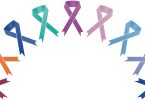With more people following screening recommendations in the U.S., rates of colorectal cancer (cancer of the colon or rectum) have dropped by 30 percent since 2001 in those age 50 and older. In fact, this cancer has recently moved from its spot as the second-most diagnosed cancer to No. 3, according to the American Cancer Society (ACS). Additionally, the death rate for those who are diagnosed with colon cancer has dropped steadily over the past 20 years, thanks to the trend toward earlier diagnosis.
New Options
For patients with suspected or diagnosed colorectal cancer or other diseases of the digestive tract, new options at UHS allow patients to receive comprehensive, compassionate care close to home.
Gastroenterologist Atif Saleem, MD, who joined UHS in August, specializes in endoscopic ultrasound procedures that can be used to assess certain suspicious polyps and aid in the diagnosis of other cancers of the gastrointestinal system and lungs.
When used to assess diseases of the digestive tract, this state-of-the-art ultrasound procedure is performed using a scope similar to the one used in colonoscopy, and is threaded into the colon, esophagus or stomach while patients are sedated. It produces detailed images of the lining of the digestive walls and nearby organs. During the same procedure, the doctor can take tiny samples of suspicious areas for testing if needed, allowing diagnosis without the need for surgery in certain cases.
Dr. Saleem is also experienced in a groundbreaking technique called EMR, which uses specialized tools threaded through a scope to remove precancerous or early stage cancerous lesions from the colon, also without the need for traditional open surgery.
Not only is colorectal cancer usually curable when caught early, in many people screening can prevent it altogether, says Amine Hila, MD, board-certified gastroenterologist at UHS. “When gastroenterologists began to use colorectal screening (called colonoscopy), they would see colorectal cancer cases regularly,” he says. “Now we see it less frequently because we are actively preventing it. The goal of screening colonoscopy is to find patients at the precancerous stage.”
WHY SCREENING WORKS
Many people have growths in their colon called polyps. While these are often not cancerous, certain types of polyps can become cancerous over time. Finding and removing them during a screening colonoscopy not only allows the doctor to test for early signs of cancer; it removes potential sources of cancer.
For this reason, you should not wait to be screened, Dr. Hila says. “Now, the majority of the colon cancers that we find are in people who did not comply with the recommendations for screening colonoscopies. They either were never scoped or didn’t come back when it was recommended.”
For people at average risk, screening should begin at age 50. Screenings are generally repeated every 10 years unless results from the colonoscopy suggest a higher risk for cancer.
Family history and other health considerations may increase your personal risk of colorectal cancer and require a unique screening schedule. For example, if a close blood relative had colorectal cancer, screening should begin 10 years before the age at which your relative was diagnosed, and repeated more frequently. It’s important to discuss personal risk factors with your doctor, says Dr. Hila. “A discussion with your doctor helps us determine the right age for screening to begin.”
Screening may also be recommended if you experience symptoms of colorectal cancer at any age, including rectal bleeding, a change in bowel habits, or abdominal pain or weight loss of unclear cause.
THE SCREENING PROCEDURE
Colonoscopy is an outpatient procedure. Patients fast and drink a laxative liquid to clear out the colon the evening before the test is scheduled. Once patients arrive at the screening clinic the next day, they are sedated, which allows them to relax or sleep during the procedure. The doctor then threads a thin scope outfitted with a tiny video camera into the colon and watches the video images on a screen, looking for polyps and other signs of disease. Polyps are removed for prevention during the procedure, and once removed are tested for cancer.
The appointment will typically take between two and three hours from arrival to departure, and most patients do not feel any pain or remember the procedure afterwards, Dr. Hila says. In fact, it is commonly observed that the most uncomfortable part of colorectal screening is drinking the prep solution the day before. Fortunately, patients now have the option to choose from a variety of newly available solutions that are more comfortable to drink than the traditional options, he says.
Make a change

The following lifestyle choices can significantly lower the risk of colorectal cancer:
- Achieve and maintain a healthy weight.
- Eat a diet high in fruits, vegetables and fiber.
- Limit the amount of red meat in your diet.
- Limit alcohol intake.
- Eliminate tobacco.
- Exercise regularly.
Follow your recommended colorectal screening schedule.
GET SCREENED …
For information on colonoscopies at UHS Hospitals, call Binghamton Gastroenterology at 772-0639. For information on colonoscopies at UHS Delaware Valley, call 865-2150. For information on colonoscopies at UHS Chenango Memorial, call 337-4800.







